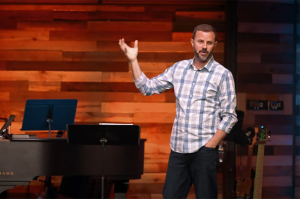Franklin Graham: From the Pit of a Prison
Evangelist Franklin Graham stepped into what was once called ''the bloodiest prison in America'' to reach out to thousands of inmates with the message of Christ.
Evangelist Franklin Graham stepped into what was once called ''the bloodiest prison in America'' to reach out to thousands of inmates with the message of Christ at the Angola Festival on Saturday.
Just a few hours away from his previous Celebration of Hope in New Orleans, the one-day festival at the Louisiana State Penitentiary drew 3,321 attendants, both from the prison and the general public, and saw 156 people make decisions for Christ.
In the midst of the festival, Graham called Saturday afternoon from the Angola Festival site to speak with The Christian Post and answer a few questions regarding the festival and the Billy Graham Evangelistic Association, which he currently heads.
CP: How is it going so far – preaching in the largest maximum-security prison in the U.S. for the first time?
Graham: It's quite an experience. You know, this is a very unusual event – being able to do something like this. Burl Cain, the warden down here, has been making these types of changes in this prison. He took the bloodiest prison in America and he's made it really into a model prison. And really, you can see the result of what Jesus Christ can do in the lives of men when Christ is brought into an institution like this and where Jesus Christ is lifted up, where church participation is encouraged, the gospel is really preached. Men's lives are really changed here. No question. They're changed.
CP: There have been several cases where prisoners turn to Christianity, such as James Tramel who became an ordained priest and is now ministering at a church in Berkeley, Calif. Do you feel this will be a more frequent case for inmates with such outreaches as these?
Graham: God works in the hearts of every man and woman in a different way. I was on death row and I talked to some men and asked them if they knew Jesus Christ and they said ‘no’ and I wanted to ask if they were interested in knowing Christ. ‘No.’
Some of them were hard hearts. There are other men that I talked to on death row that told me that Jesus Christ had come into their hearts, into their lives, that it had changed their lives and that they knew their sins were forgiven. They knew they were on their way to Heaven and they weren't afraid. They were thankful to God for what God has done for them through Jesus Christ. So there are people here who turn to Christ. You got a lot of mean people in this prison, still. This is a penitentiary, this is a prison, and there are some tough people here.
CP: This year seems to be marked by unprecedented projects and festivals with televangelism, your first time holding a festival in Asia, and now your first festival in a prison. What other landmarks does the BGEA hope to make this year?
Graham: I have no idea. We take it one day at a time and we try to do all that we can to tell men and women about God's love, his son Jesus Christ. And that's just what we do. In the last three years we've been able to tell more people about Christ, and we have seen more people accepting Christ than we had in the last 60 years combined, and God has opened up some tremendous doors. We've got some great opportunities not only in this country, but all over the world, and we're going to continue to keep doing it.
CP: The Rev. Billy Graham was one of the, if not the, first ‘televangelist.’ And the BGEA recently had a hugely successful television outreach to people in India. After some 50 years, do you feel this outreach tool is being widely used today or is it still being underutilized?
Graham: First, I don't know, but my father's never liked that word ‘televangelist.’ He's an evangelist who has used television, radio and the Internet. We've seen tremendous success these past few years and we hope and pray God will continue to open doors. Is it underutilized? Oh sure, yes. We need to do more not less. But like anything else, it's the cost. It's hugely expensive to go on television especially in this country or anywhere else in the world but we are doing all that we can to spend our resources to reaching the lost.
CP: You had the chance to preach with your father in New Orleans recently and he said that it was probably the last public sermon he'd ever preach at the age of 87. How is it that you want to follow these impacting footsteps to a point where you can preach no more?
Graham: As long as I have health and strength, I'm going to preach. That's what I'm going to do. I'm 53 years old. If the Lord gives me 20 years, or 30 years or if He gives me five years, whatever it is, I want to be faithful to Him.




























